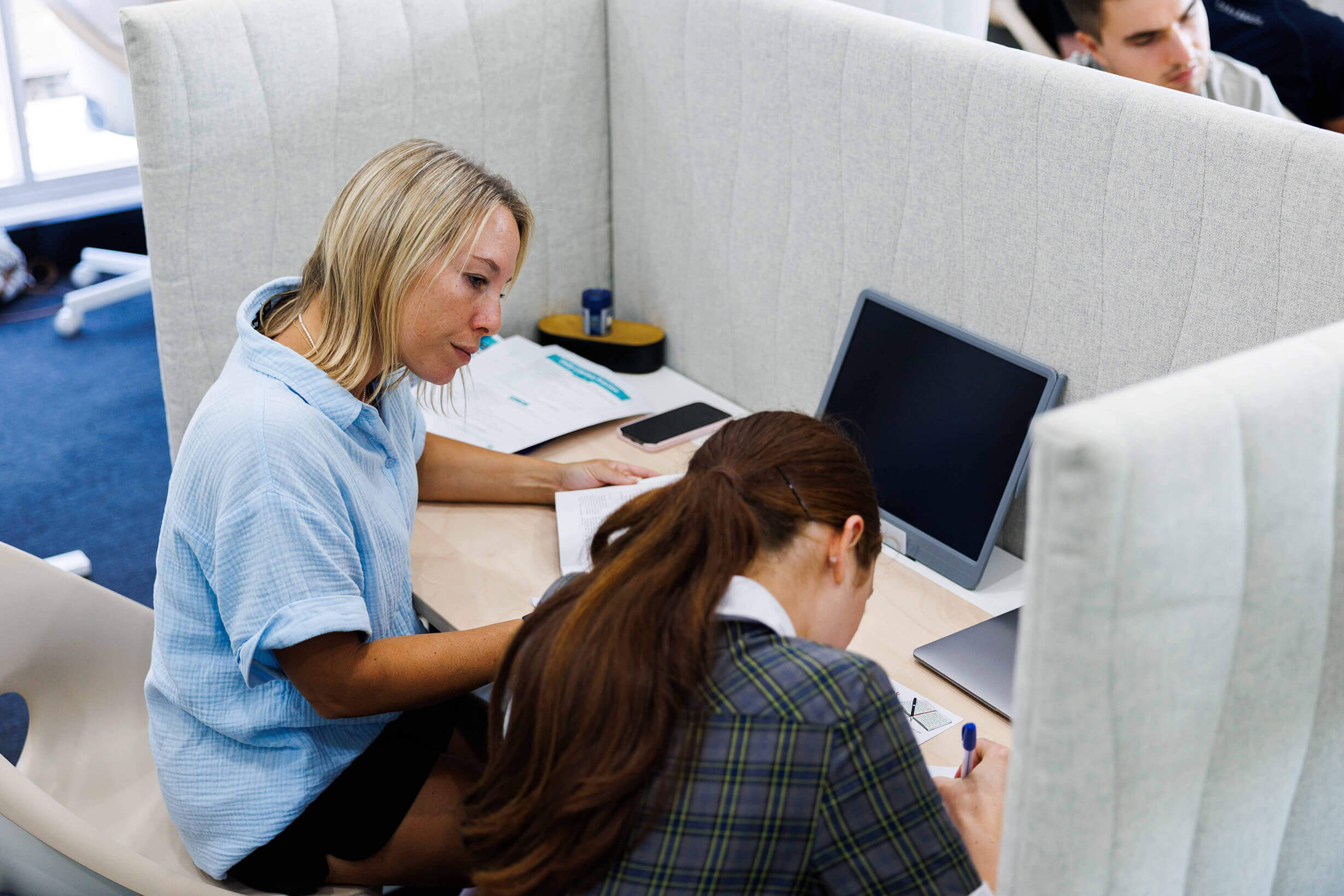
Common Secondary School Maths Struggles and How Tutors Help
For many parents and students alike, secondary school mathematics can feel daunting. Maths becomes increasingly complex, often causing frustration, stress, and uncertainty, regardless of whether your child is just stepping into Year 7 or preparing for critical exams in Year 10.
Fortunately, these challenges can be handled effectively with the right support.
Today, we will explore common maths struggles faced by students in secondary school (Years 7–10) and show how personalised tutoring can significantly improve not only academic results but also confidence and problem-solving skills.
What Are Some Common Struggles Students Face in Secondary School Maths?
Secondary school maths introduces new challenges that many students find intimidating. Understanding these common struggles helps parents better support their children’s academic journey.


1. Transition Challenges from Primary to Secondary School Mathematics
The change from primary to secondary school can be tricky, especially when it comes to the subject maths. Students entering Year 7 maths face a new environment. The classrooms become larger, teaching styles vary, and mathematical concepts quickly become more abstract and demanding.
Year 7 maths and year 8 maths students often struggle because they must rapidly adapt to increased academic expectations without fully solidifying foundational numeracy skills.
2. Difficulty Grasping Abstract Mathematical Concepts
Secondary school mathematics introduces concepts such as algebra, geometry, and more complex fractions and equations, which are highly abstract topics.
For students in Year 7 maths and Year 8 maths, this increased complexity can become overwhelming. Students may feel lost when dealing with variables, formulas, or geometrical theorems because they cannot clearly visualise these abstract ideas.


3. Gaps in Foundational Numeracy Skills
Another significant challenge arises when students miss or misunderstand essential math concepts earlier in their education.
Even minor gaps in foundational skills such as multiplication tables, fractions, and basic number sense can snowball into bigger problems in secondary school maths.
Students who experience these gaps often become increasingly frustrated and may lose motivation or confidence altogether.
4. Issues with Exam Preparation and Assessment Anxiety
Assessments and tests in years 7 – 10 are often the reason for anxiety for students. Many worry about their performance in tests and assignments, which leads them to avoid studying or panic during exams.
This anxiety negatively impacts both their mental well-being and their academic performance, and creates a cycle of stress and low achievement.


What Is The Role of Secondary School Maths Tutoring in Developing Students’ Problem-Solving Abilities?
Secondary school maths tutoring provides targeted help that directly addresses the above-mentioned struggles and enables year 7 maths and year 8 maths students to develop essential problem-solving abilities.
1. The Students Develop Critical Problem-Solving Skills
One of the greatest benefits of secondary school maths tutoring is helping students understand how to approach complex problems systematically.
Tutors break down complex and intimidating questions into manageable steps, which allows students to build the skills and confidence they need to independently solve problems.
Students learn strategies that help them to think critically and logically across all subjects.
2. Tutoring Helps Reinforce Essential Mathematical Foundations
Personalised tutoring specifically targets foundational gaps by revisiting and clarifying basic concepts before moving onto advanced topics.
Tutors use high-quality Year 7–10 maths teaching resources which are closely aligned with the NSW syllabus, to make sure that each student fully understands foundational principles.
When these basics are strong, students can confidently progress to more challenging maths concepts.
3. Tutoring Helps Build Academic Confidence and Motivation
Beyond academic improvement, tutors create a supportive learning environment that encourages curiosity, confidence, and enthusiasm for maths.
Instead of feeling anxious, students see the subject of maths as approachable and achievable, which significantly improves their willingness to engage and persist through challenges.
Why One-on-One Attention Makes a Difference in Secondary School Maths
Classroom teachers do their best, but large classes and limited lesson time make personalised attention difficult. Here’s why one-on-one tutoring has such a powerful impact:


1. Personalised Instructions Based on Individual Learning Styles
Every child learns differently. While some students grasp maths quickly through visuals, others prefer hands-on practice, and some like to hear clear explanations.
One-on-one tutoring allows tutors to quickly identify and adapt lessons to your child’s specific learning style, which makes maths more accessible and less stressful.
2. Immediate Feedback and Direct Support
Unlike classrooms where misunderstandings can go unnoticed, tutors immediately spot when a student is struggling and step in to clarify concepts instantly.
This instant feedback dramatically improves learning outcomes, as students do not carry misconceptions into future lessons or tests.


3. Customised Pacing to Suit Student Needs
Tutoring offers flexibility. Tutors can adjust the pace of learning and spend more time on difficult topics to progress quickly through areas where the student is already confident.
This personalised approach makes sure that students always feel supported, understood, and encouraged.
How Do Tutors Create Personalised Learning Plans?
Expert tutors understand that no two students are alike. Personalised learning plans form the backbone of successful tutoring sessions. Here’s how tutors create and implement these plans:

1. Carry Out Initial Assessment to Identify Strengths and Weaknesses
First, tutors conduct thorough assessments to identify exactly where a student is excelling and where they need extra help. Identifying these strengths and weaknesses early helps shape an effective tutoring strategy tailored specifically to your child’s unique academic profile.
2. Setting Clear and Achievable Learning Goals
Once the assessment is complete, tutors collaborate with students and parents to set clear, achievable goals. These might include improving performance in algebra, mastering geometry, or becoming confident with exams.
Having clear targets motivates students and helps them stay focused on their progress.
3. Regular Progress Monitoring and Adjustments
Tutors provide regular progress updates, ensuring parents and students always know how they’re tracking. These regular check-ins help tutors adapt the learning plan as needed, refining lessons to ensure consistent improvement and achievement of set goals.

What Are The Additional Benefits of Secondary School Math Tutoring?
Secondary School math tutoring offers far more than just academic improvement. Here’s how personalised tutoring can positively impact your child’s confidence, study skills, and overall well-being.
How to Choose The Right Secondary School Math Tutor? Factors to Consider
Finding the right tutor can significantly improve your child’s maths performance. Here are key factors to help you select the ideal secondary school maths tutor for your child’s needs.
- Experience and Qualifications: Look for tutors who have strong credentials and proven experience teaching maths aligned with the NSW syllabus.
- Personality and Rapport: Choose someone your child connects well with; a positive relationship greatly enhances learning outcomes.
- Teaching Approach and Resources: Ensure the tutor employs effective methods and provides access to quality resources tailored specifically to year 7–10 maths.

Conclusion
Secondary school mathematics challenges are common but manageable. With targeted, personalised support through tutoring, your child can overcome these struggles and thrive academically.
Tutoring not only addresses gaps in maths understanding but also builds essential life skills, confidence, and resilience. If you want your child to approach year 7 maths and year 8 maths with confidence and achieve lasting academic success, personalised tutoring could be the perfect solution.
Get started by booking a complimentary introductory session with the StudySpace. Our expert tutors are ready to discuss your child’s specific needs and help them flourish academically and personally.
Discover how secondary school math tutoring can unlock your child’s full potential because every child deserves the opportunity to excel.
Early tutoring for kindergarten students can make a big difference in your child’s learning journey. Building strong literacy, numeracy, and confidence at this young age sets children up for future school success and a lifelong love of learning.
Want to see how Study Space can help your child? Try our free introductory tutoring session today and experience our friendly, personalised approach firsthand. Let our tutors help your child thrive!
